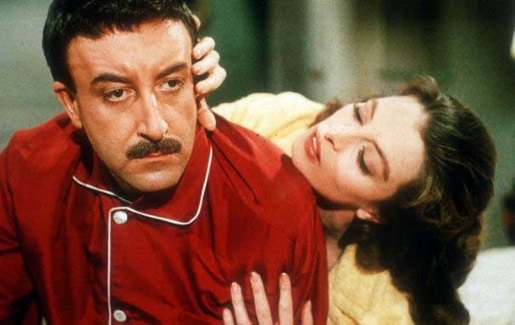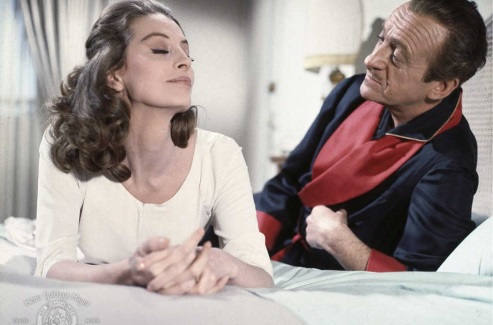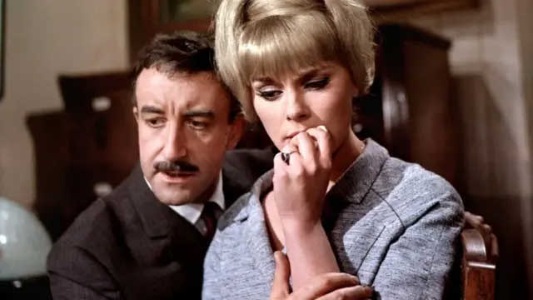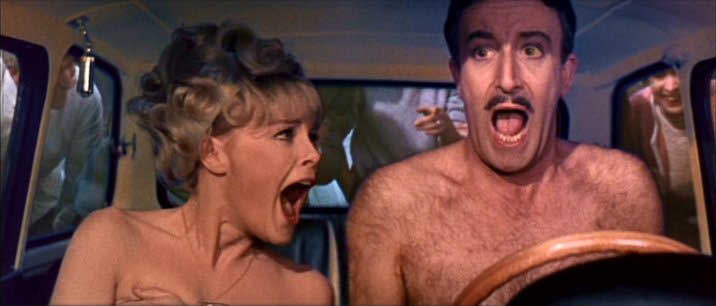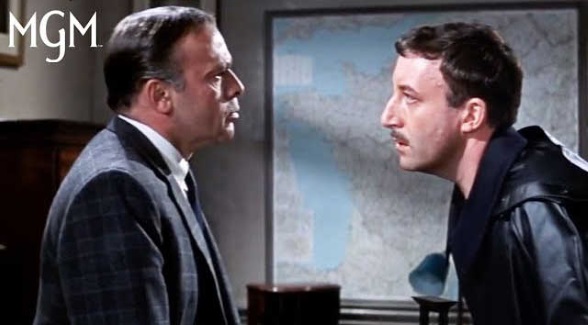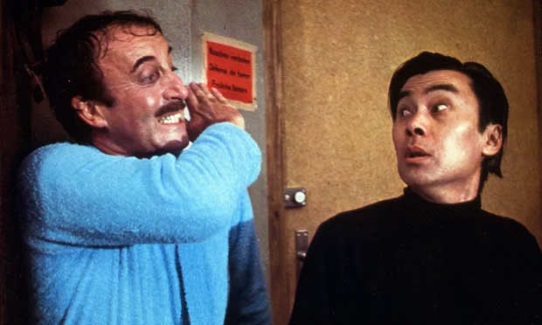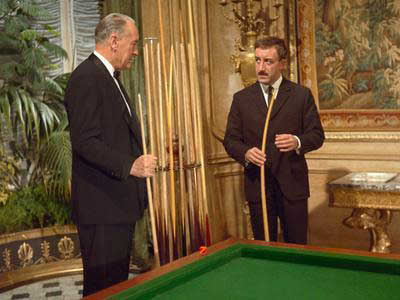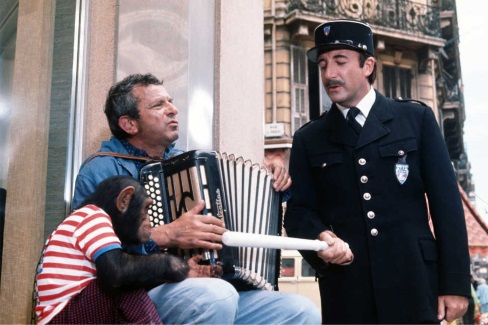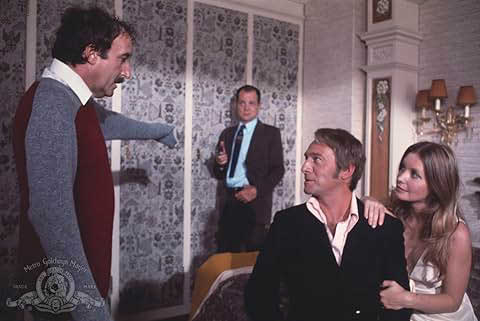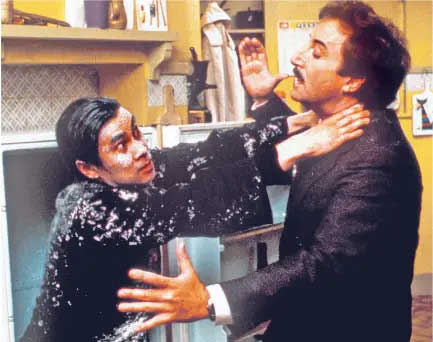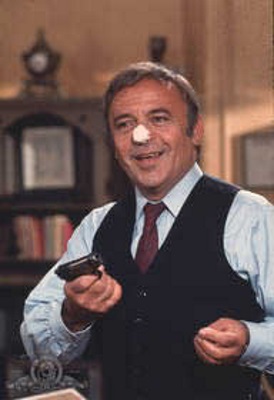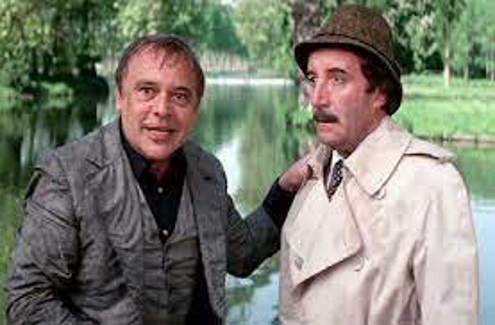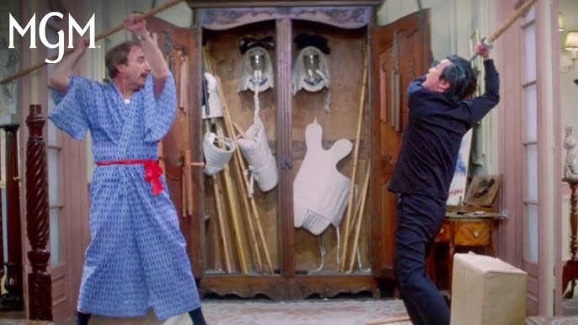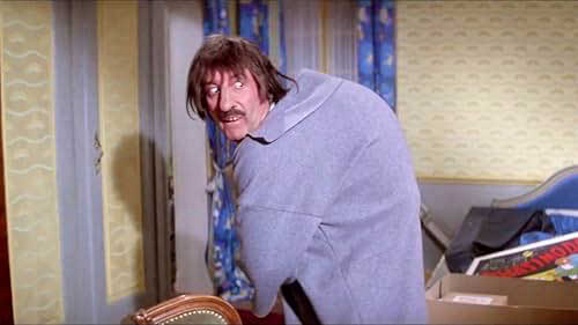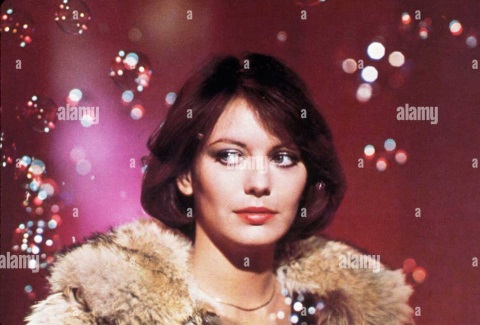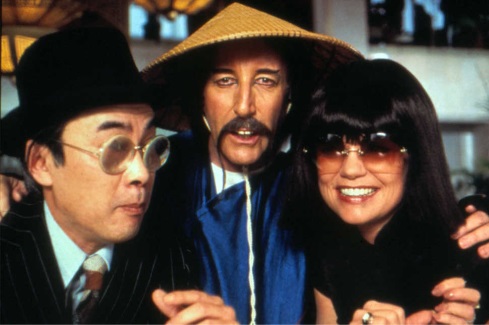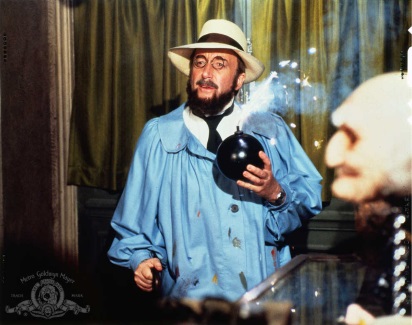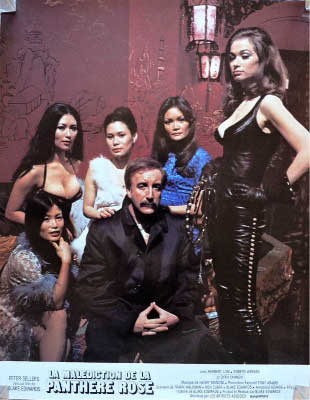The Peter
Sellers Pink Panther Series
The Pink Panther (1963) – 6.0
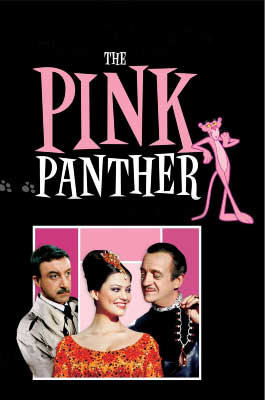
Watching this for the first time in probably 50 years, it is surprising to
me that this became a franchise. It isn't really that great. There are a
couple good scenes that hit the mark like the bedroom farce and the car crashes,
but much of it lumbers along depending entirely on Clouseau stumbling, bumbling,
tripping and being cuckolded by his wife. The parts with David Niven being
a smooth lothario at 52-years old but looking 60 are like walking through
wet tar. It seems clear by the ending that no one was planning at that point
on a sequel starring Peter Sellers. Initially, they had Peter Ustinov signed
up to play Clouseau but when Ava Gardner as his wife dropped out, so did
he and they got Sellers. At that time, Sellers was not an international star
with mainly British productions to his name and Lolita. But during filming,
he so impressed director Blake Edwards that his role kept getting larger
and he just allowed Sellers to do go for it, endlessly. Hard to imagine what
Ustinov would have done with that role. It did well enough at the box office
that they decided to do a sequel - dropping Nivens, Clouseau's wife and adding
Kwouk as his manservant and Herbert Lom as his supervisor - and a classic
was made. And Sellers is much funnier in the sequel than he is here, much
more emphasizing the French accent and comedy of the absurd.
The Pink Panther, if people have forgotten, is a diamond with a panther image
deeply embedded in it. It is worth a fortune and a Maharajah has left it
to his daughter - played by a never more beautiful Claudia Cardinale. Inspector
Clouseau leading a task force is after the Phantom - a gentleman jewel thief
for many years without being caught. He is played by Nivens. What Clouseau
doesn't know but the audience quickly does is that his wife (Capucine) is
in cahoots with the Phantom and also his lover. He praises his wife for saving
the household money so that she can afford a $10,000 mink coat. Needlessly,
coming into the picture is Robert Wagner as Niven's nephew who is there to
add complications but does anyone like Wagner anymore? How was this guy popular
once? He is like an advertisement for smug white privilege.
Nivens sets his eye on the diamond and at a ski resort he does his best to
seduce the Princess with champagne and charm, but seeing Niven's face crawling
up her neck was like watching a rhinoceros trying to make love to a flamingo.
Clouseau with his wife is also at the resort and every time he leaves the
room, Nivens and Capucine are in each other's arms - leading to the best
scene in the film when Wagner also comes to seduce her and both of them are
there when Clouseau returns hiding under the bed and in the shower. It is
an old routine going back to Shakespear I think but it works again. I was
bored to death at the one-hour mark but it picks up with a few funny bits
and the ending is rather Perry Mason classic, too bad they didn't get Raymond
Burr to play the lawyer. Later when they played the Mancini Pink Panther
theme for Nivens at an occasion, he told them to stop. That film was Sellers,
not me. True enough.
A Shot in the
Dark (1964) – 7.0
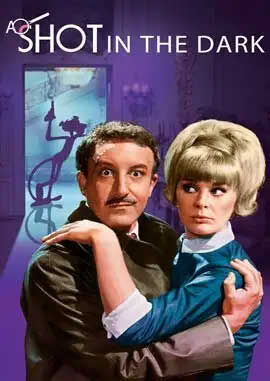
I saw this when I was about ten years old, I think. I couldn't recall much
about it other than I laughed a lot and Elke Sommer. Yes, even at ten I had
a few hormones working. Maybe more than I do now. I was almost afraid to
watch it again assuming my sense of humor had gotten much more sophisticated
in the intervening years. Apparently not. I laughed throughout at the silliest
things. This is comic gold. I just watched Peter Sellers in two films - The
Bobo and The Fiendish Plot of Fu Manchu and thought them as funny as a nail
in my foot. Nice seeing the genius in him again. What made him a star. Sellers
had been making British films for over a decade and they barely made a splash
on the shores of America, but his films as Inspector Clouseau made him a
beloved star in Hollywood.
A Shot in the Dark makes no mention of the Pink Panther. That happened in
the film before this one. The Pink Panther starred David Niven as a jewel
thief after a diamond named The Pink Panther. Sellers as Clouseau was the
policeman after him. Niven was the star but as the making of it went on director
Blake Edwards was so loving Seller's performance that his role kept getting
larger. So, in this sequel Sellers is very much the star. They add a couple
actors who were to stick with the remaining sequels and became stars as well.
Herbert Lom who was born in Prague and began acting in Czech films before
moving to Hollywood. Perhaps just in time since his mother was Jewish. When
he went to England his Jewish girlfriend was with him but did not have the
proper papers and was sent back. Where she died in a concentration camp.
As Commissioner Dreyfus his hatred for Clouseau and his decline into madness
with his twitch is classic.
Also classic is of course Burt Kwouk as Cato, his man-servant with instructions
to attack him at all times. Kwouk has an interesting background. Born in
England to Chinese who were on a European tour, but he was brought up in
Shanghai. His father was very wealthy and descended from a Tang Dynasty general.
But with the Communist revolution, they lost everything and Kwouk ended up
back in England and appeared in his first film in 1957. Everybody loves Burt
Kwouk and anytime I see him in another films, I tend to yell out, it's Burt
Kwouk. Elke Sommer was born in Germany during the war and worked as an au
pair in London. What wife would have hired Elke as an au pair is hard to
imagine. But she was discovered not in London, but in Italy on vacation by
the great Victorio De Sica. A Shot in the Dark was the film that really brought
her to the attention of American audiences and me.
The Pink Panther films became a franchise - they get a little confusing though.
Sellers was in six of them but then there was another film, Trail of the
Pink Panther, that used footage of previous films as Sellers had died. In
between those there was Inspector Clouseau in 1968 that starred Alan Arkin
as the title character. Both Sellers and Edwards were off making The Party.
Edwards kept trying to keep the franchise going even after Seller's death
with Curse of the Pink Panther in 1983 and Son of the Pink Panther starring
Roberto Benigni as the son. That was it for Edwards but not for the Pink
Panther. Steve Martin made two films as Clouseau in 2006 and 2009. I have
to think whether I want to go down that road and see them all - I think they
progressively get worse.
The humor for this film is nothing but pratfalls. One after the other after
the other for 90-minutes. But Sellers was a genius at making them all funny.
It is really remarkable that by the fifth one, you don't think to yourself
ok, that's enough - humor has evolved since Mack Sennett but they all cracked
me up from falling into water a few times, getting entangled with phone lines
or pool cues or finding himself in a nudist colony. He is trying to solve
a murder that becomes murders in a large chalet headed by George Sanders.
He is instantly enamored by Elke and even though she is found a few times
with the weapon in her hand and a dead body at her feet, he is sure she is
innocent. There is the big denouement at the end and I have no clue who killed
who and it really doesn't matter. Henry Mancini composes the music.
The Return of
the Pink Panther (1975) – 7.0
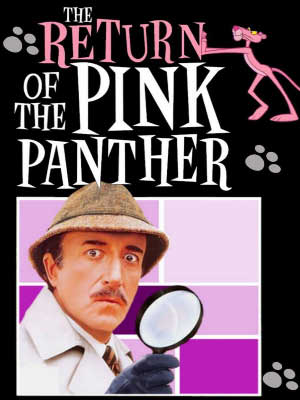
Blake Edwards and Peter Sellers did not get along very well during the filming
of A Shot in the Dark - a pattern that was to continue during all of their
collaborations - often refusing to talk to one another and passing notes.
So perhaps it is understandable that no immediate sequel followed that film.
Sellers was also on his road to stardom - his tour de force in Dr. Strangelove,
What's New Pussycat, Casino Royale and The Party (required viewing once a
year by my parents) gave him international clout - so there was no need for
him to follow it up with another portrayal as Clouseau. The Pink Panther
though was kept alive with a cartoon version beginning in 1968 and running
for years. There was also a forgotten 1968 Pink Panther film titled Inspector
Clouseau starring Alan Arkin. By 1975 things had changed for the worse for
Sellers - he had divorced his third wife, his recent films had not done well
and according to him a dead person told him to go back to Clouseau. You don't
refuse when the dead speak to you.
Blake was willing and both Herbert Lom and Burt Kwouk were still around,
as was André Maranne who had played Dreyfus's number two in A Shot
in the Dark and for the rest of the Seller's Pink Panther films. So, ten
years after A Shot in the Dark they made a sequel. And the film script went
back to the first film in the series (The Pink Panther) and brought back
the diamond and the Phantom, this time played by Christopher Plummer. And
it was a big success. And it is very funny. How much of that was Sellers
or the writers I don't know but there is one lovely sequence after another
and the set-piece of Sellers with a vacuum cleaner - parrot - light bulb
- sauna is brilliant. Ten minutes of laughs. Lots of smaller ones as well.
The revolving door and the fight with a desk cracked me up.
In a scene right out of the heist films of the time. an individual in mask
sneaks into a museum in an imaginary Middle East country and steals the Pink
Panther Diamond. Perhaps the museum guide should not have demonstrated all
the security to the tourists. Too bad Claudia Cardinale doesn't come with
it. Clouseau has been demoted to patrolman and is lecturing a blind man and
his "minkey" while a robbery goes on right behind him. Dreyfus clearly on
the verge of a nervous breakdown fires him with great satisfaction only to
be notified that the President of that country has specifically requested
that Clouseau be in charge of the investigation since he solved the first
one.
And attempts begin immediately on his life. The Phantom has retired to the
good but boring life with his wife (Catherine Schell), but when he reads
about the theft, he knows he will be blamed because the robber left a white
glove behind. His trademark. Besides the fun, the assassination attempts
that never quite go right - we get two Sellers-Kwouk engagements - to some
degree my favorite part of the Pink Panther films. The success of this
one led to another sequel, The Pink Panther Strikes Back the following year.
The Pink Panther
Strikes Again (1976) – 7.0
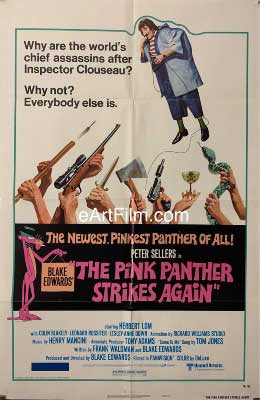
After the eleven-year gap between the Inspector Clouseau films (A Shot in
the dark and The Return of The Pink Panther) the Return had proven that if
anything the series was more popular than before. The filmmakers therefore
aimed for something bigger. Often the downfall of franchises and sequels
when they leave their roots. This was to be a James Bond parody with Clouseau
as an accident-prone Bond and his old Chief Inspector boss Dreyfuss (Herbert
Lom) as a combination of The Phantom of the Opera and Stavros Bolfeld. The
idea seems farfetched and on paper doesn’t really work – a ray machine that
can make buildings disappear? But the building blocks of this silly idea
are pure Clouseau and all of the comedic set pieces work to great effect.
This is very funny and Seller’s going through it straight-faced and never
losing confidence in his brilliance no matter how incompetent he is to all
around him is ludicrously absurd.
After the ending of The Return of the Pink Panther in 1975, Chief Inspector
Dreyfus was committed to a mental institution. In that film he became obsessed
with killing Clouseau. Three years have passed in movie time and Dreyfus
appears cured to his therapist and will be released that afternoon. Then
Clouseau visits him and it all goes to hell. The eye twitch comes back, the
quivering lip and after being dunked in the water accidentally by Clouseau
a number of times, he cracks. This is a bit ironic because the director
Blake Edwards who had been with Sellers in various films for years thought
Sellers in real life was the one who should be in an institution. He felt
Sellers was nuts and said if you had a group of mental patients and Sellers
together, you would guess that Sellers was the craziest. Yet they continued
to work together till Sellers' death in 1980. His erratic behavior was evident
to all those around him.
After seeing Dreyfus chase Clouseau around the grounds, Dreyfus’s release
is denied. So, he escapes with only one thought in mind. Kill Clouseau. At
a most opportune time he tries, when Cato (Kwouk) and Clouseau are having
one of their classic martial arts fights that destroys much of the apartment
– again. In the apartment beneath them, Dreyfus is planting dynamite to blow
them up. It of course fails - as it always does. Next Dreyfus goes big time
- he kidnaps a scientist and his daughter to build a death ray in a castle
with a drawbridge. That drawbridge is used to great comic effect later on.
In pure Bond villain bravado, he transmits himself on TV to threaten the
world that he will make the UN disappear if they don’t kill Clouseau. The
President (modeled after Ford) and his advisor (modeled after Kissinger)
are only too happy to oblige as are over twenty other nations who all send
their best assassins to kill Clouseau. You can imagine how that goes. One
of them is an uncredited Omar Sharif as the Egyptian assassin and Lesley-Anne
Down as the Russian agent (who got the role after she agreed to take her
clothes off. A few actresses refused). Also appearing is Leonard Rossiter
(Reginald Perrin) and Colin Blakely. This did very well at the box office
and they went on to make Revenge of the Pink Panther. These would all be
great to watch in a theater full of people.
Revenge of the
Pink Panther (1978) – 6.0
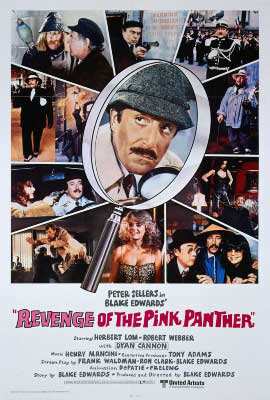
It could be that watching five Pink Panther films in a row isn't the best
idea. By this one, it felt a little derivative of the others - a string of
gags and bits in search of a plot. Which is actually what director Blake
Edwards had suggested. There was so much cut out from the previous film,
Pink Panther Strikes Again, that he wanted to take all that cut footage and
use it in this film and then shoot some new material around it. Sellers put
the nix on that idea. Instead, those cut pieces were used in The Trail of
the Pink Panther after Sellers had died. The writers seemed to have
figured out that the audience enjoyed all the failed attempts on Clouseau's
life, Burt Kwouk, Sellers in disguise and Herbert Lom as Dreyfus going crazy.
That is the plot basically. Some very good bits in there but others like
Kwouk not being able to see because of thick glasses is beaten to death.
This turned out to be Seller's final Pink Panther film - though a sequel
was in the planning stage - due to his death and looking back, the ending
of this film is perfect as he romantically walks into the distance with Dyan
Cannon. Not stumbling or tripping. Amazing that one of his most respected
performances in Being There was still to come.
Clouseau is still in charge of the French police and poor Dreyfus is once
again residing in a mental institution. In fact, Clouseau has been
awarded by the French President. He is a national hero. The French Mafia
being run by Douvier (Robert Webber) is in trouble because the home branch
in New York thinks he has gotten weak. In order to prove them wrong, he asks
his men what he can do. Kill Clouseau says one. That will show them. He is
an idiot I hear, says one. Another says, he only pretends to be an idiot.
Do it says Douvier and then cuddles with his secretary played by Cannon.
We have been here before so we know this will not go well for the assassins
- a bomb destroys a city block but not Clouseau in his Toulouse-Lautrec disguise.
Next an import from Hong Kong (a Caucasian) does his homage to Bruce Lee
by breaking a desk (Marlowe) and goes off to kill Clouseau. Not even knowing
it, Clouseau sends him to his death.
But the next attempt is successful - sort of - they kill the man driving
Clouseau's car - not knowing that he has been carjacked by a male transvestite
(in fact played by a female). Everyone thinks Clouseau is dead including
Cato who has immediately turned Clouseau's apartment into a Chinese brothel
- Clouseau often refers to him as his "little yellow friend" - not considered
racist then one presumes? Dreyfus is immediately cured, released and put
in charge of the case and reading his eulogy. Clouseau goes undercover in
various disguises. The film shifts to Hong Kong. A lot more screen time for
Kwouk after all these films which is great - Sellers and Cannon have good
chemistry - and of course the finale ends up in a fireworks warehouse.
